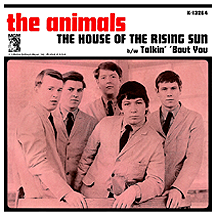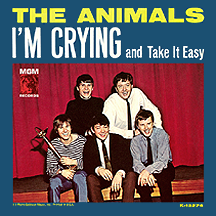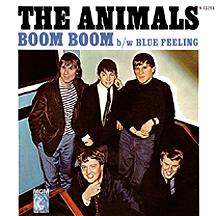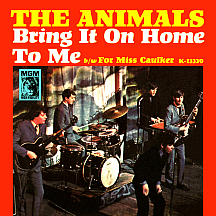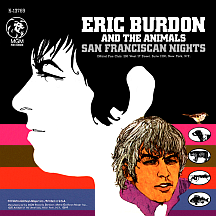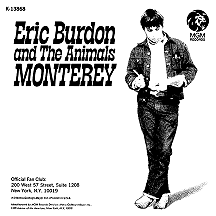THE ANIMALS
The members of late-1950s British band The Alan Price Combo had but one interest: playing North American blues and R&B. Originally from Newcastle upon Tyne in Northern England, keyboard player Price and company indulged in their primary musical passion for several years. When likeminded singer Eric Burdon joined around 1962, there were no plans to switch and at first they didn't. But changing times converged with creative impulses and eventually brought about a new direction. Giorgio Gomelsky's involvement marked the first pivotal moment in the band's evolution when he became their manager and booked them for a lengthy stay in 1964 at the Crawdaddy Club in Richmond, Surrey, placing the young upstarts closer to London and the epicenter of the music scene than they had been up in the northeast corner of the country.
Besides Price and Burdon, the group's lineup came together with guitarist Hilton Valentine, bass player Bryan "Chas" Chandler and drummer John Steel. They were loud and raucous, but perhaps no more than The Bluesbreakers playing London's Marquee Club or The Rolling Stones, who'd headlined the Crawdaddy prior to moving a rung or four up the ladder. Still, their stage show prompted one reviewer to refer to the band as "a bunch of wild animals," which didn't offend them as intended, instead providing inspiration for a new name. Producer Mickie Most signed them to a contract and it didn't take much effort for The Animals to put a hit on the charts.
"Baby Let Me Take You Home" was credited as a traditional composition on the label of the band's debut single for EMI's Columbia label; variations of the song had been improvised by blues and folk singers for decades. When the record was released on MGM in the U.S., writer credit was designated as Bert Russell (a psedonym for Bert Berns) and Wes Farrell, revealing a more direct connection to "Baby Let Me Hold Your Hand," which they had written for soul singer Hoagy Lands, an early '64 single no doubt familiar to the group. Both versions are remarkable. The Lands record didn't make it; the Animals version was a chart hit in England in the spring. MGM promoted the B side in the States, "Gonna Send You Back to Walker," another early '64 R&B tune, this one a fair sized hit for Timmy Shaw as "Gonna Send You Back to Georgia," but a no-show at first for Burdon and the boys.
The British Invasion had been under way for some six months, but the Animals weren't yet a part of it. The second single, "The House of the Rising Sun" (already a chart-topper in the U.K.), struck like a lightning bolt, debuting on the charts in August and jumping to number one a month later. A folk song with origins shrouded in mystery and a history going back perhaps two or three centuries, the Americanized adaptation concerning '...a house in New Orleans' appeared with slightly varying titles and was recorded by scores of mid-century artists including Woody Guthrie, Leadbelly and Bob Dylan. Burdon's unrelentingly dramatic vocal on the Animals recording has made it the version to which all others are compared. MGM immediately revived "Gonna Send You Back to Walker" (Shaw's original location adjusted for a U.K. setting) and it belatedly appeared on the charts while "Rising Sun" was perched at the summit.
Then Price and Burdon wrote one of their own..."I'm Crying" was an Animals original! So much for the band's policy of sticking with blues and R&B covers, other than the song's lean in a bluesy direction. It debuted on the charts in September and made a respectable climb to the top 20 several weeks later (top ten in England as well). With three simultaneous hits, the band made the jump to the silver screen. Get Yourself a College Girl, starring Mary Ann Mobley, was about as pointless as any film gets...except, that is, for its impressive lineup of music acts, including The Dave Clark Five, Stan Getz and Astrud Gilberto, Jimmy Smith and the pre-hit Standells. The Animals eschewed their hits for Chuck Berry's "Around and Around" and the flip of the forthcoming fourth single, "Blue Feeling." Within weeks they popped up in another theatrical film, Pop Gear (released in America as Go Go Mania). One more movie appearance, in It's a Bikini World, emerged a couple of years later.
That fourth single's A side found them in familiar form, rockin' the John Lee Hooker gem from a couple of years earlier, "Boom Boom." Next up was "Don't Let Me Be Misunderstood," written by Bennie Benjamin, Sol Marcus and Gloria Caldwell, performed as a downtempo declaration by band favorite Nina Simone towards the end of 1964. The band animalized it, taking their urgent, uptempo interpretation to the top 20 in early '65, followed by a remake of one of Sam Cooke's best, "Bring it on Home to Me," also a noticeable variant on the arrangement of the original. Mickie Most, always one to go with proven hitmaking formulas, gave the group quite a bit of free reign but had his way with the next single, "We Gotta Get Out of This Place," by one of the Brill Building's premier songwriting teams, Barry Mann and Cynthia Weil. The band's distinctly British take on an American song became a rebellious anthem of sorts (protesting the previous generation represented by his '...daddy in bed a-dyin'...he's been workin' and slavin' his life away,' offering the hopeful notion that 'girl, there's a better life for me and you'). In the summer of 1965 it became their highest-charting hit since "Rising Sun" a year earlier.
About this time the group, together just two years, began to break apart. Alan Price quit, citing a fear of the flying required to visit other countries on tour as the main reason, though there may have been a personality clash with Burdon and other group members. Keyboardist Dave Rowberry was his replacement. The group relied on another pair of Brill Building writers for the next single, "It's My Life." Composed by Roger Atkins and Carl D'Errico, it was hard-hitting rocker, suggesting the group was drifting away from its R&B roots. Burdon, now the prevailing leader of the group, wanted more freedom in all areas and orchestrated a split between the Animals and producer Most. They began working with MGM staff producer Tom Wilson and the first single under his direction was another song with a long history, "Inside - Looking Out," derived from the chant "Rosie" as adapted by Alan Lomax (whose work in recording and archiving blues, folk and other musical idioms ranks him among the most important 20th century figures in music) with additional lyrics by Burdon and Chandler. Then the decision was made to record another Brill brainchild, this one from Gerry Goffin and Carole King; "Don't Bring Me Down" is so strong it's easy to see why they chose to do it. Besides, it served double duty as a subliminal message to Mickie Most. 1966 had begun with rockin' attitude.
John Steel was the next to go, replaced on drums by Barry Jenkins, fresh off a stint with another Most-produced group, The Nashville Teens. Chas Chandler and Hilton Valentine also departed, leaving Burdon the only remaining original Animal. By this time Price had put together a new outfit, the Alan Price Set, and hit the U.S. charts in the summer of '66 with "I Put a Spell on You," an organ-intensive remake of the Screamin' Jay Hawkins blood-curdler from '56. It was the only single by Price to crack the U.S. charts, but in the U.K. it went top ten and started a run of hits rivaling the Animals themselves on the home front. Chandler moved away from performing, working as a producer and manager, representing several acts including Seattle-born Jimi Hendrix, helping establish him in England before breaking the multitalented artist back in the States.
The next Animals release, "See See Rider," updated the 1924 Ma Rainey blues standard and put them back into the American top ten in the summer of '66. It was the first single credited to Eric Burdon and the Animals, signaling Burdon's control as the leader of what would be an often-changing lineup. Songwriters Scott English and Lawrence Weiss supplied "Help Me Girl," which hit the charts first by Cleveland, Ohio group The Outsiders, though Burdon's competing version ultimately went higher. As 1967 began the band featured guitarist John Weider, pianist/guitarist Vic Briggs and bassist Danny McCulloch, in addition to Burdon and drummer Jenkins. Five consecutive single releases were complete group efforts and gave label credit to all five as songwriters. First up was the Native American-influenced psychedelia of "When I Was Young," a recounting of lead singer Burdon's somewhat depressing childhood ('...pain more painful, laughter much louder'), insinuating that adulthood is less of a burden (...'I was so much older then').
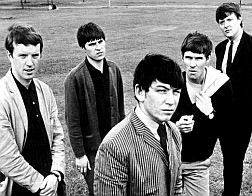
The band had shifted headquarters to Los Angeles and the music was taking on more of an American sound, less like rhythm and blues but heavier in lyric and execution. "San Franciscan Nights" took a more positive stance than the previous single, celebrating the love-ins and peace movement of the summer of '67 centered around the city's Haight-Ashbury district; next to "House of the Rising Sun," it was the most successful of all Animals hits. In England, B side "Good Times" was promoted instead due to an assumption that islanders wouldn't relate to the San Francisco scene. "Monterey" kept the group in the general vicinity, vividly describing the joys of attending the Monterey International Pop Festival of June 1967, its lyrics singling out The Byrds, Jefferson Airplane, Ravi Shankar, The Who, Hugh Masekela, The Grateful Dead, Jimi Hendrix, Brian "Prince" Jones (of the Rolling Stones) and 'ten thousand electric guitars' groovin' real loud!
The first 45 of 1968, ballad "Anything," was the first of 12 straight Animals singles to fall short of the top 40. They bounced back with "Sky Pilot" in the summertime, making a timely connection to the Vietnam war while avoiding any specific mention of which conflict, current of historic, the song was set in. Briggs and McCulloch exited the swinging door, replaced by organist Zoot Money and guitarist Andy Summers (of later Police fame). Burdon's "White Houses" was all over the map lyrically, emphasizing one line of advice: 'You better get straight!' It was the last single release in the U.S. for the band. A remake of Johnny Cash's "Ring of Fire" in early '69 marked the end of their U.K. hit streak and the group separated shortly afterward.
Burdon hooked up with a California funk band, Nightshift, later in the year. As Eric Burdon and War, they turned the summer of 1970 on its head with "Spill the Wine," a seriously freaky narrative about a dream featuring Burdon as '...an overfed, long-haired leaping gnome.' It was a smash hit, though any real meaning can only be found in Eric's subconscious...if even there. This new association lasted through two albums of funky jazz-rock, then War went on to major fame with an impressive string of 1970s hits. The group continues its barrage to this day. The original early-'60s Animals quintet reformed briefly in 1975, then again in '77 and once again in the early 1980s, scoring one final hit in '83, "The Night." Eric Burdon has done some occasional film acting through the years and remains musically active, touring with yet another new herd of Animals. I caught one of the band's shows recently; he, and they, are performing at a level on par with what The Animals were doing in their heyday.
NOTABLE SINGLES:
- Baby Let Me Take You Home /
Gonna Send You Back to Walker - 1964 - The House of the Rising Sun - 1964
- I'm Crying - 1964
- Boom Boom - 1964
- Don't Let Me Be Misunderstood - 1965
- Bring it on Home to Me - 1965
- We Gotta Get Out of This Place - 1965
- It's My Life /
I'm Going to Change the World - 1965 - Inside - Looking Out - 1966
- Don't Bring Me Down - 1966
- I Put a Spell on You - 1966
by Alan Price Set - See See Rider /
Hey Gyp - 1966 - Help Me Girl - 1966
- When I Was Young - 1967
- San Franciscan Nights /
Good Times - 1967 - Monterey - 1967
- Anything - 1968
- Sky Pilot - 1968
- White Houses - 1968
- Ring of Fire - 1969
- Spill the Wine - 1970
by Eric Burdon and War - They Can't Take Away Our Music /
Home Cookin' - 1971
by Eric Burdon and War - The Night - 1983


